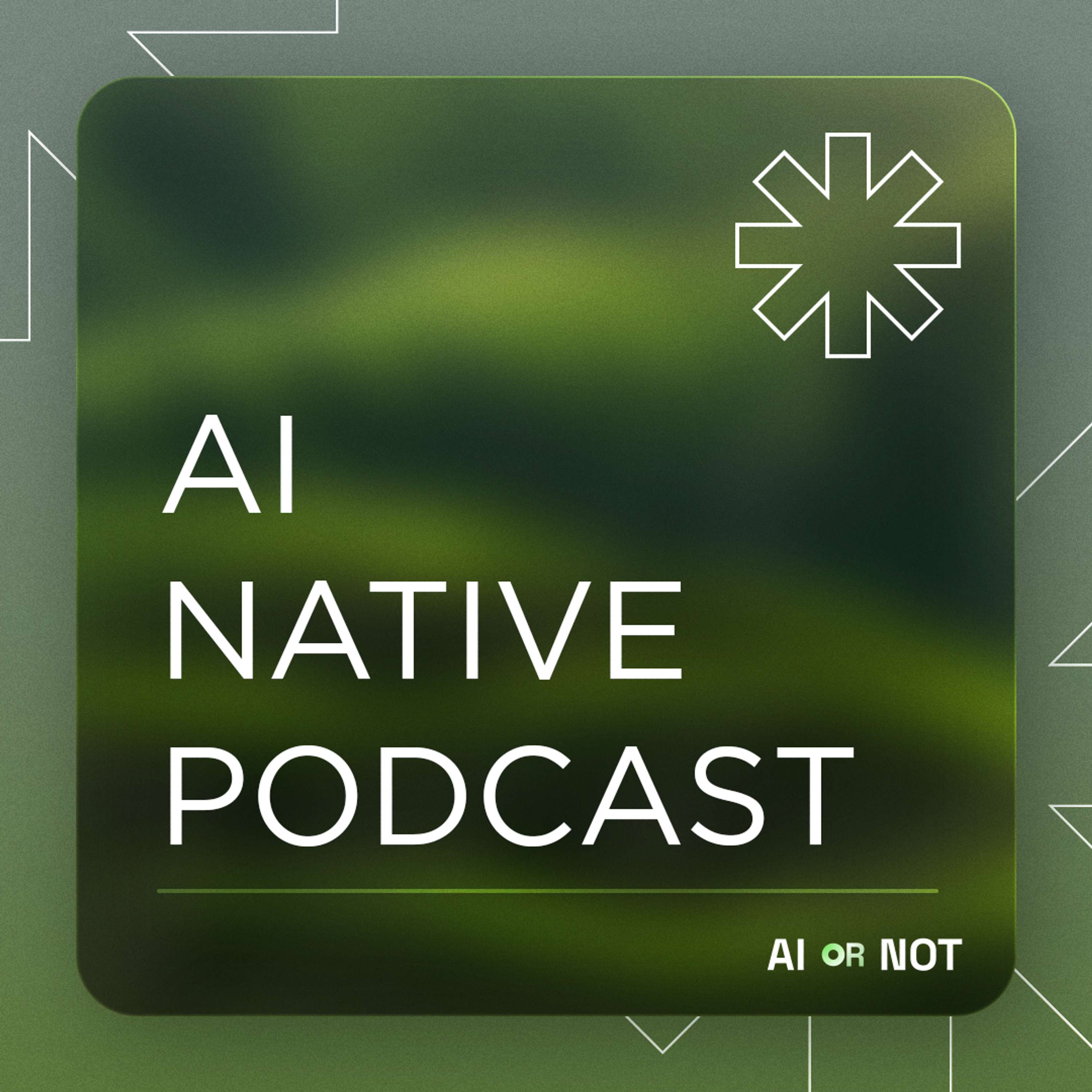AI Native Podcast

AI Native Podcast
Podcast Description
Welcome to the AI Native Podcast, where we explore how artificial intelligence is changing our world. Each episode features simple, straight-forward conversations with experts and everyday people about the latest trends and ideas in AI. Tune in to learn how technology is shaping our lives and get inspired for the future.
Podcast Insights
Content Themes
The podcast explores a range of themes including the implications of AI in mental health, the intersection of art and technology, and the importance of intrinsic motivations in a capitalistic society. For example, episodes discuss the challenges of AI-generated art and its effects on real artistic expression, alongside an in-depth look at how psychological practices can adapt in the face of advancing technology.

Welcome to the AI Native Podcast, where we explore how artificial intelligence is changing our world. Each episode features simple, straight-forward conversations with experts and everyday people about the latest trends and ideas in AI. Tune in to learn how technology is shaping our lives and get inspired for the future.
Today’s guest is Agustin Vivas de Lorenzi, Founding Member at DevRev—the AI-native platform unifying customer support, product, and revenue teams. We dig into the real-world shape of AI agents (SDR, AE, Support), why enterprise search + a unified data layer is the unlock, and how tiny teams are hitting $10M ARR by automating the boring stuff while keeping the human story front and center. Sponsored by AIorNot.com—detect AI-generated text, images, audio, video and deepfakes in one place. (DevRev, aiornot.com)
Key Takeaways
- Agents work where data is unified. DevRev’s Airdrop ingests/syncs tools and builds a knowledge graph, enabling accurate enterprise search and agent actions across support, product, and revenue workflows. (DevRev)
- Tiny, mighty teams: Startups are reaching ~$10M ARR with ~10–20 people by deploying AI agents for SDR, AE, and Customer Support—automating repetitive tasks and keeping humans for high-context work. (Discussed in episode.)
- Enterprise vs. SMB: Small companies can hire one experienced “agent ops” owner and ship fast; enterprises stall on internal builds, compliance, and cross-team alignment before circling back to a vendor. (Discussed in episode.)
- Human story wins. As “AI slop” floods feeds, audiences will seek content with a verifiable human arc—authenticity, provenance, and outcomes. Detection tools (like AIorNot) help restore trust signals. (aiornot.com)
- DevRev momentum: Series A $100.8M; valuation ~$1.15B; mission: connect end users, support, sales, product, and devs on one AI-native platform. (Reuters, DevRev)
Chaptered Timeline
- 00:00 Cold open — “You can create AI SDR/AE/Support agents today”
- 00:55 Welcome + guest intro: Agus Vivas (DevRev) & why human stories still matter
- 02:06 Career arc: consulting → banking ops → tokenized real estate → AI GTM
- 05:25 Inside Argentine banking ops: CSAT, churn, and support as a revenue stream
- 07:35 DevRev origin: bridging customer-facing and backend teams; tool sprawl → single AI-native layer (DevRev)
- 09:58Airdrop & migration: hours not months; privacy and coexistence with existing stacks (DevRev)
- 10:58Enterprise Search (Turing): “ChatGPT for your company data” → faster decisions (DevRev)
- 12:11 Market noise & the unicorn bar: from hype to durable design principles (Reuters)
- 13:00 Playbook: SMB vs. Enterprise—how each should roll out agents
- 17:02 Where agents hit hardest: customer experience first; GTM second
- 18:18 Full-stack outbound: prospect discovery + signal detection + 1-click omni-channel sequences
- 20:06 The downside of AI content: sameness, distrust, and detection layers (AIorNot) (aiornot.com)
- 24:00 Education & kids: keeping the “thinking muscle” while using AI as leverage
- 30:30 Closing: “Human + AI to enhance, not replace” → where to find Agus
Quotes
- “We’ll chase the real story behind the content—that human imprint AI can’t fake.”
- “Startups are hitting $10M ARR with teams of twenty because agents remove the busywork.”
- “It’s not speed for speed’s sake; it’s speed that preserves value and trust.”
Guest
Agustín Vivas de Lorenzi — Founding Member, GTM @ DevRev
Guest socials: LinkedIn → https://www.linkedin.com/in/agusvivasdl
Context: Founding GTM at DevRev since 2023; background in banking ops (Galicia), tokenized real-estate (Bricks); MBA at Governors State University. (THE ORG)
Links & Resources
- DevRev – AI-native platform for support, product & revenue (Airdrop, Enterprise Search) → devrev.ai. (DevRev)
- DevRev Series A ($100.8M, $1.15B val.) → DevRev blog / Reuters coverage. (DevRev, Reuters)
- Airdrop (data ingestion/sync) → product page & docs. (DevRev)
- Enterprise Search / Turing → product explainer & demos. (DevRev)
- AIorNot (sponsor) – Free AI detector; enterprise tools. (aiornot.com)
- Agus on LinkedIn → https://www.linkedin.com/in/agusvivasdl (guest-provided)
Sponsor:
AIorNot.com — Free AI checker for text, images, music & video; enterprise detection and moderation tools. (aiornot.com)

Disclaimer
This podcast’s information is provided for general reference and was obtained from publicly accessible sources. The Podcast Collaborative neither produces nor verifies the content, accuracy, or suitability of this podcast. Views and opinions belong solely to the podcast creators and guests.
For a complete disclaimer, please see our Full Disclaimer on the archive page. The Podcast Collaborative bears no responsibility for the podcast’s themes, language, or overall content. Listener discretion is advised. Read our Terms of Use and Privacy Policy for more details.